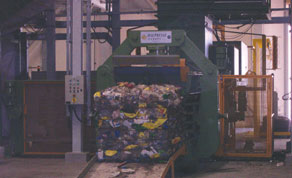 |
| A cube of crushed plastic ready for recycling |
A senior official from the Ministry of Environment’s Waste Treatment Centre (WMC) has called upon Qatar’s residents to reduce their generation of trash to lower the cost of waste management in the country where a person produces an average of 1.6kilos of domestic waste per day.
It will also help the government plans on eventually eliminating landfill use as a waste management option, he said.
Abdulaziz Mohamed al-Malki, head of supervision section, WMC, speaking to Gulf Times, explained that the centre currently receives between 1,000-1,400 tonnes of solid waste per day, but this is likely to increase as new transfer stations are completed in Umm Al Afai, Mesaimeer and Industrial Area, with the possibility of another in the north of the country being built.
He said that WMC can process 2,300 tonnes of domestic waste per day, but is optimally run at around 1,500 tonnes per day as this allows time for the waste to dry in the on-site “bunker” in order to burn at a higher temperature.
He also said that the Ministry of Environment is encouraging other players such as private companies and the Ministry of Municipality and Urban Planning, who handles garbage collection, to improve waste management by helping to separate domestic waste at the source. In order for this to be done effectively, individuals will likely need to separate their own waste instead of putting it all into garbage bags.
Al-Malki said that separating organic waste from other materials like plastics will also improve the quality of compost produced by WMC, helping to improve soil quality in Qatar’s farms.
The integrated Waste Management Centre is the only one of its kind in the Middle East, and, according to al-Malki, has drawn a lot of attention from neighbouring countries who are impressed by the recycling and elimination of over 95% of waste and are looking to emulate the model.
WMC, which has been operational for only a few months, can process and recycle plastics, paper, aluminium and other metals, construction and organic waste. Aside from the recycled materials and organic compost, the plant generates power by incinerating unrecyclable waste in a controlled manner to generate energy, while toxins are neutralised and filtered under constantly monitored conditions to ensure that there is no threat to the environment.
Less than 30% of the electricity generated is used to power the facility, while the rest will feed into the national power grid once a few technical issues have been resolved.
Only 3-5% of the processed materials currently end up as waste in the form of ash from the incinerator, and the Ministry of Environment is currently working with experts to find a use for it in the Qatar market as it is a commonly used material elsewhere. The only material currently not being put back into the market is glass as there is no industry in Qatar that wants it, so it is simply being collected and stored on site.
The government plans on eventually eliminating landfill use as a waste management option, and space for expanding the facility is available. However, al-Malki pointed out that the ideal solution is to simply reduce the estimated 1.6kilos of domestic waste produced per capita per day.

